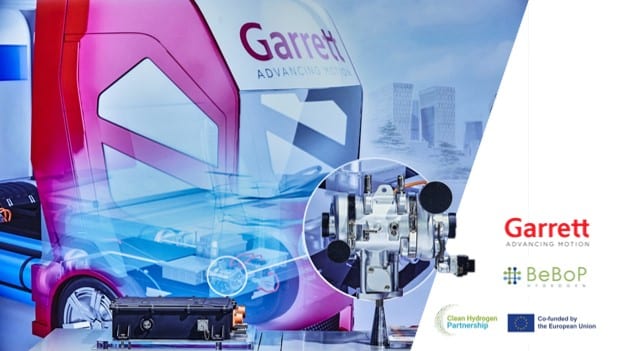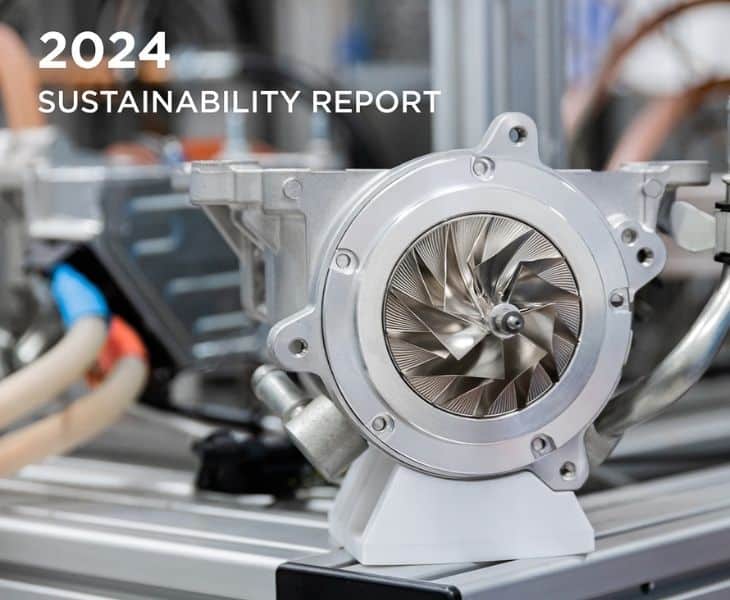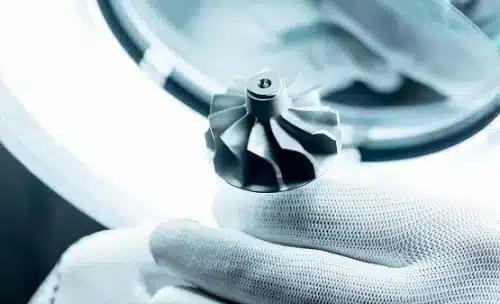Advancing Zero-Emission Heavy-Duty Vehicles: Garrett’s Role in the BeBoP Fuel Cell Project

Garrett Branded Truck showcasing the Fuel Cell Compressor
The push for zero-emission heavy-duty transport is accelerating, and hydrogen fuel cells are emerging as a game-changer. At the forefront of this transition is the Horizon Europe project, BeBoP, which aims to develop more efficient and cost-effective fuel cell components. A key contributor to this effort is Garrett Motion, whose advanced Fuel Cell Compressor (FCC) technology is helping drive the future of hydrogen-powered mobility.
BeBoP — short for “Beyond state-of-the-art Efficiency by improving Balance of Plant components” — is a collaborative initiative bringing together leading component developers, powertrain designers, and research institutions. Over the next three and a half years, the project will focus on optimizing Balance of Plant (BoP) components, which are essential to fuel cell system performance, efficiency, and durability.
The Critical Role of Garrett’s Fuel Cell Compressor
At the heart of a fuel cell system, the Fuel Cell Compressor (FCC) ensures the right amount of air (oxygen) reaches the stack at the correct pressure to generate electricity. As one of the largest energy consumers within the system — accounting for 10%-15% of the fuel cell stack’s energy output — its efficiency is crucial. A well-optimized FCC reduces power consumption, enhances system performance, and improves overall vehicle range.
Garrett’s cutting-edge FCC technology is designed to meet these challenges head-on. It quickly adapts to load changes, ensuring stable operation under varying driving conditions. By optimizing this critical component, Garrett is helping improve efficiency, durability, and affordability — key factors for widespread adoption in heavy-duty transport.
Driving Innovation and Scalability
As part of the BeBoP project, Garrett is contributing through advanced simulations, prototype compressors, and rigorous durability testing. The goal is to refine BoP components, reducing hydrogen consumption while maximizing energy efficiency. By testing components for steady-state efficiency and dynamic performance, the project ensures fuel cell systems can meet the demanding requirements of long-haul and heavy-load applications.
Beyond innovation, BeBoP also aims to scale and standardize fuel cell component designs, supporting European manufacturers in bringing reliable, cost-effective solutions to market. By paving the way for industrialized production, the project is accelerating the large-scale deployment of hydrogen-powered heavy-duty vehicles.
A Shared Vision for a Greener Future
Garrett’s role in the BeBoP project underscores its commitment to innovation and sustainability. By advancing Fuel Cell Compressor technology and improving BoP components, Garrett is helping to make hydrogen-powered transport more viable, efficient, and scalable.
As the world transitions to cleaner mobility, projects like BeBoP demonstrate the power of collaboration in shaping a zero-emission future.
About the BeBoP project
The project is supported by the Clean Hydrogen Partnership and its members, including top-up funding by the Swiss State Secretariat for Education, Research and Innovation (SERI). Co-funded by the European Union under Grant Agreement No. 101192365.
Views and opinions expressed are however those of the author(s) only and do not necessarily reflect those of the European Union or the Clean Hydrogen Partnership. Neither the European Union nor the granting authority can be held responsible for them.








